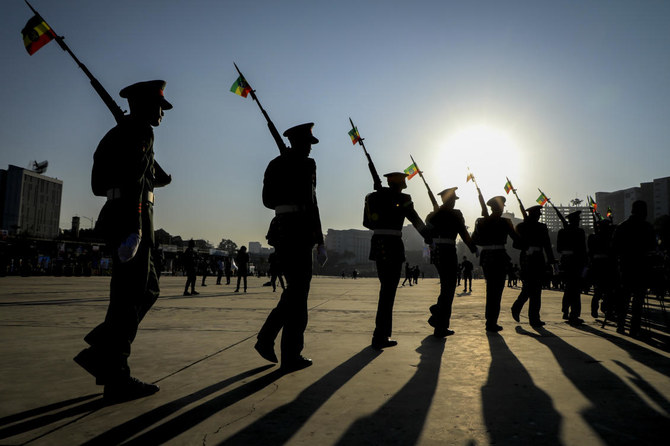NAIROBI: The capital of Ethiopia’s northern Tigray region was hit by an air strike on Tuesday, hospital officials and Tigrayan rebels said.
The reported strike on Mekele came just days after the Tigray People’s Liberation Front (TPLF) said it was ready for a cease-fire and talks with Prime Minister Abiy Ahmed’s government after nearly two years of war.
“AbiyAhmed’s drones targeted MekelleUniversity Adi Haki campus,” TPLF spokesman Getachew Reda said on Twitter.
Another TPLF spokesman, Kindeya Gebrehiwot, also said on Twitter that Mekele University had been “bombed” causing injuries and property damage, which was still being assessed.
“This is happening after the Govt of Tigray established a negotiating team & expressed its readiness for peace talks,” he said.
Kibrom Gebreselassie, a senior official at Tigray’s Ayder hospital, also said on Twitter there had been “an early morning drone attack” on Mekele.
“One injured patient has arrived at Ayder. Total casualties not yet known,” he said.
AFP was not able to independently verify the claims. Access to northern Ethiopia is severely restricted and Tigray has been under a communications blackout for over a year.
There was no immediate comment from government officials.
Tigray has been hit by several air strikes since fighting resumed in late August between government forces and their allies and TPLF rebels in northern Ethiopia.
The return to combat shattered a March truce that had paused the worst of the bloodshed, and dashed hopes of peacefully resolving a war that began nearly two years ago.
The fresh offensives have also drawn in Eritrean troops and cut off aid deliveries into Tigray, where the UN says a lack of food, fuel and medicine is causing a humanitarian disaster.
Both sides have accused the other of firing first, and fighting has spread from around southern Tigray to other fronts further to the north and west.
On Sunday, the TPLF said it was ready for a cease-fire and would accept a peace process led by the African Union, removing an obstacle to negotiations with Abiy’s government.
The TPLF said a negotiating team including Getachew and General Tsadkan Gebretensae, a former Ethiopian army chief now in Tigray’s central military command, was “ready to be deployed without delay.”
The international community — including UN Secretary-General Antonio Guterres, AU Commission chief Moussa Faki Mahamat, and US Secretary of State Antony Blinken — has urged the warring sides to seize the moment for peace.
Addis Ababa is yet to officially comment on the overture.
The Ethiopian government has previously said it was ready for unconditional talks “anytime, anywhere,” brokered by the Addis Ababa-headquartered AU.
Untold numbers of civilians have been killed since the war erupted in Africa’s second most populous country, and grave rights violations by all sides against civilians have been documented.
In March, the UN said at least 304 civilians had been killed in the three months prior in air strikes “apparently carried out by the Ethiopian Air Force.”
The UN human rights office has documented aerial bombardments and drone strikes on refugee camps, a hotel and a market, and warned that disproportionate attacks against non-military targets could amount to war crimes.
The government has accused the TPLF of staging civilian deaths from air strikes to manufacture outrage, and insists it only targets military sites.
Abiy, a Nobel Peace laureate, sent troops into Tigray in November 2020 to topple the TPLF in response to what he said were attacks by the region’s former ruling party on federal army camps.
But the TPLF recaptured most of Tigray in a surprise comeback in June 2021.
It then expanded into the neighboring regions of Afar and Amhara before the fighting reached a stalemate.
















